Christian Counselling: Confidentiality, Environment, and Communication
VerifiedAdded on 2023/06/05
|7
|1383
|322
Essay
AI Summary
This essay provides a comprehensive overview of Christian counselling, addressing key considerations for counselees, the crucial role of confidentiality, and the impact of the therapeutic environment. It delves into ethical considerations for counsellors, such as avoiding negative talk and managing clingy clients. The importance of timing, active listening, and continuous communication in the counselling process are highlighted. Furthermore, the essay explores how individuals contribute to problem settings, the impact of environmental limitations, and the role of childhood experiences. It emphasizes the significance of understanding a counselee's relationships and how counsellors can empower clients to solve their problems independently, rather than fostering over-dependence. The essay concludes by referencing relevant literature on counselling effectiveness and client-counsellor dynamics.
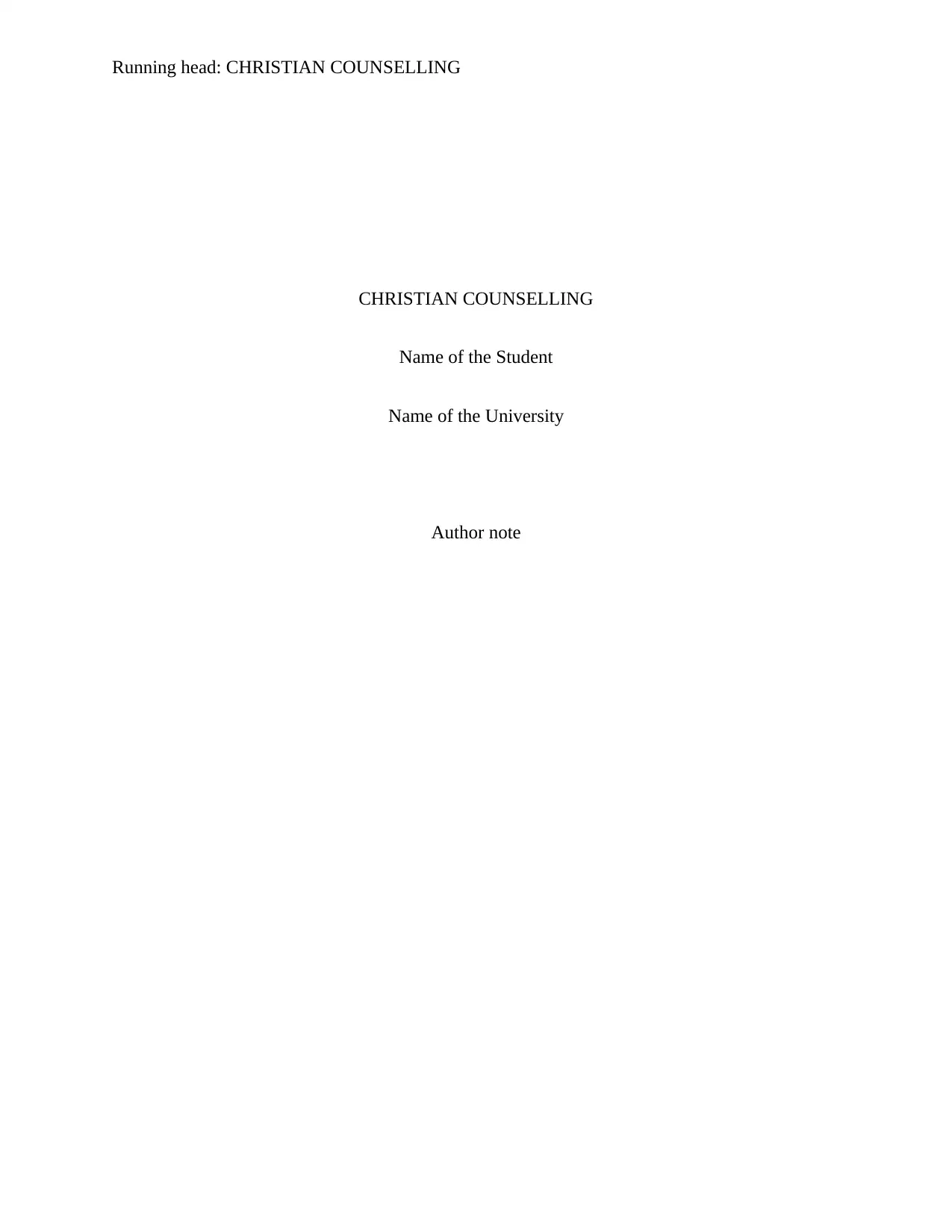
Running head: CHRISTIAN COUNSELLING
CHRISTIAN COUNSELLING
Name of the Student
Name of the University
Author note
CHRISTIAN COUNSELLING
Name of the Student
Name of the University
Author note
Paraphrase This Document
Need a fresh take? Get an instant paraphrase of this document with our AI Paraphraser
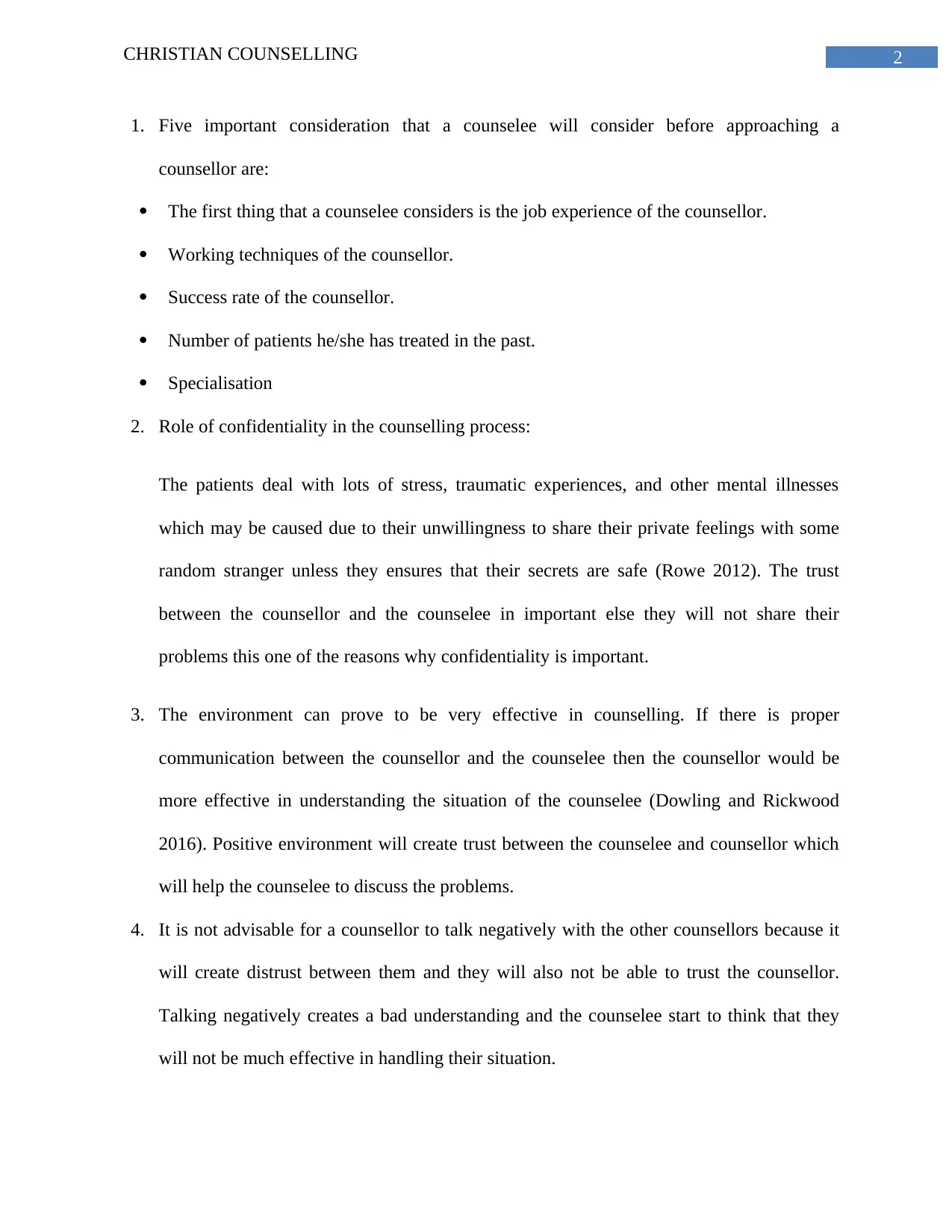
2CHRISTIAN COUNSELLING
1. Five important consideration that a counselee will consider before approaching a
counsellor are:
The first thing that a counselee considers is the job experience of the counsellor.
Working techniques of the counsellor.
Success rate of the counsellor.
Number of patients he/she has treated in the past.
Specialisation
2. Role of confidentiality in the counselling process:
The patients deal with lots of stress, traumatic experiences, and other mental illnesses
which may be caused due to their unwillingness to share their private feelings with some
random stranger unless they ensures that their secrets are safe (Rowe 2012). The trust
between the counsellor and the counselee in important else they will not share their
problems this one of the reasons why confidentiality is important.
3. The environment can prove to be very effective in counselling. If there is proper
communication between the counsellor and the counselee then the counsellor would be
more effective in understanding the situation of the counselee (Dowling and Rickwood
2016). Positive environment will create trust between the counselee and counsellor which
will help the counselee to discuss the problems.
4. It is not advisable for a counsellor to talk negatively with the other counsellors because it
will create distrust between them and they will also not be able to trust the counsellor.
Talking negatively creates a bad understanding and the counselee start to think that they
will not be much effective in handling their situation.
1. Five important consideration that a counselee will consider before approaching a
counsellor are:
The first thing that a counselee considers is the job experience of the counsellor.
Working techniques of the counsellor.
Success rate of the counsellor.
Number of patients he/she has treated in the past.
Specialisation
2. Role of confidentiality in the counselling process:
The patients deal with lots of stress, traumatic experiences, and other mental illnesses
which may be caused due to their unwillingness to share their private feelings with some
random stranger unless they ensures that their secrets are safe (Rowe 2012). The trust
between the counsellor and the counselee in important else they will not share their
problems this one of the reasons why confidentiality is important.
3. The environment can prove to be very effective in counselling. If there is proper
communication between the counsellor and the counselee then the counsellor would be
more effective in understanding the situation of the counselee (Dowling and Rickwood
2016). Positive environment will create trust between the counselee and counsellor which
will help the counselee to discuss the problems.
4. It is not advisable for a counsellor to talk negatively with the other counsellors because it
will create distrust between them and they will also not be able to trust the counsellor.
Talking negatively creates a bad understanding and the counselee start to think that they
will not be much effective in handling their situation.
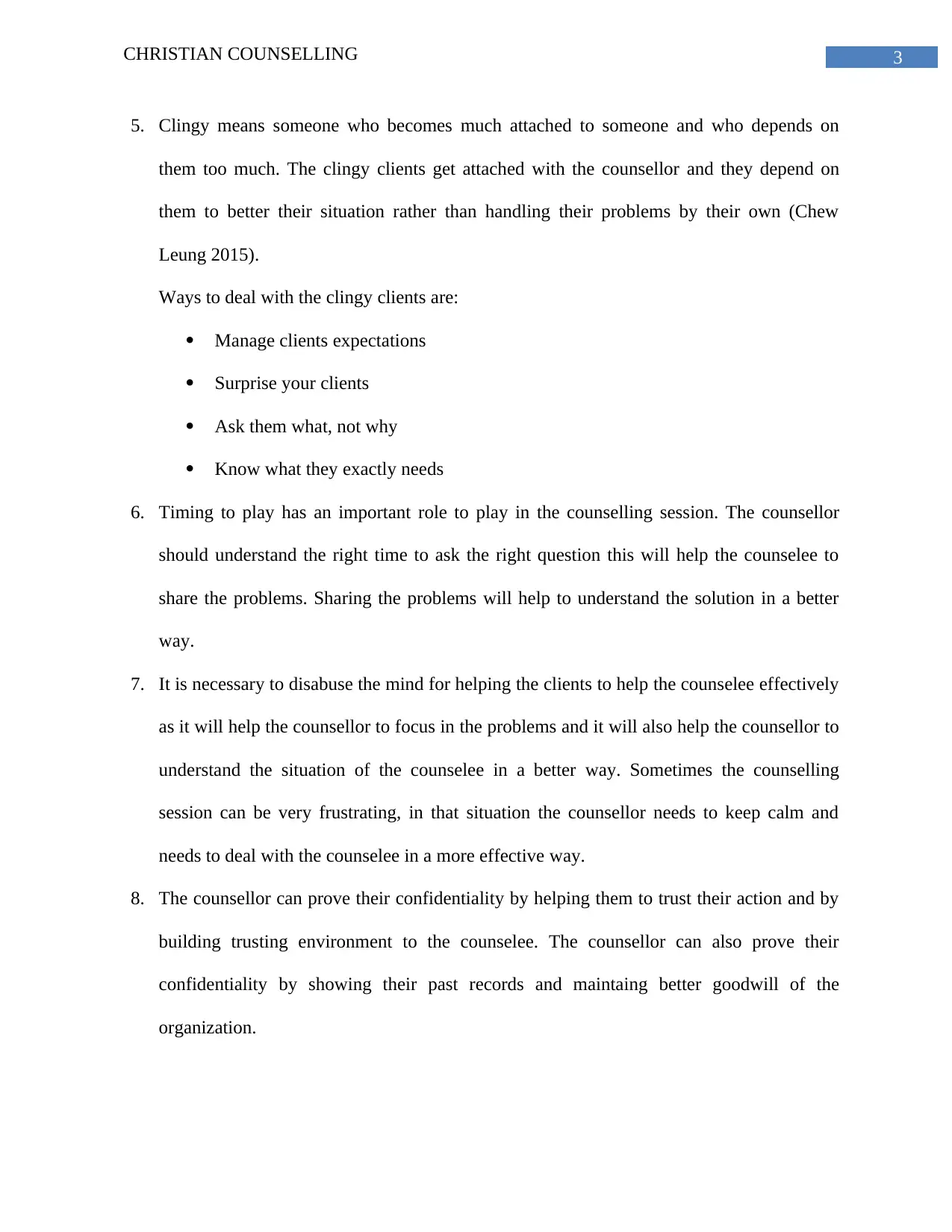
3CHRISTIAN COUNSELLING
5. Clingy means someone who becomes much attached to someone and who depends on
them too much. The clingy clients get attached with the counsellor and they depend on
them to better their situation rather than handling their problems by their own (Chew
Leung 2015).
Ways to deal with the clingy clients are:
Manage clients expectations
Surprise your clients
Ask them what, not why
Know what they exactly needs
6. Timing to play has an important role to play in the counselling session. The counsellor
should understand the right time to ask the right question this will help the counselee to
share the problems. Sharing the problems will help to understand the solution in a better
way.
7. It is necessary to disabuse the mind for helping the clients to help the counselee effectively
as it will help the counsellor to focus in the problems and it will also help the counsellor to
understand the situation of the counselee in a better way. Sometimes the counselling
session can be very frustrating, in that situation the counsellor needs to keep calm and
needs to deal with the counselee in a more effective way.
8. The counsellor can prove their confidentiality by helping them to trust their action and by
building trusting environment to the counselee. The counsellor can also prove their
confidentiality by showing their past records and maintaing better goodwill of the
organization.
5. Clingy means someone who becomes much attached to someone and who depends on
them too much. The clingy clients get attached with the counsellor and they depend on
them to better their situation rather than handling their problems by their own (Chew
Leung 2015).
Ways to deal with the clingy clients are:
Manage clients expectations
Surprise your clients
Ask them what, not why
Know what they exactly needs
6. Timing to play has an important role to play in the counselling session. The counsellor
should understand the right time to ask the right question this will help the counselee to
share the problems. Sharing the problems will help to understand the solution in a better
way.
7. It is necessary to disabuse the mind for helping the clients to help the counselee effectively
as it will help the counsellor to focus in the problems and it will also help the counsellor to
understand the situation of the counselee in a better way. Sometimes the counselling
session can be very frustrating, in that situation the counsellor needs to keep calm and
needs to deal with the counselee in a more effective way.
8. The counsellor can prove their confidentiality by helping them to trust their action and by
building trusting environment to the counselee. The counsellor can also prove their
confidentiality by showing their past records and maintaing better goodwill of the
organization.
⊘ This is a preview!⊘
Do you want full access?
Subscribe today to unlock all pages.

Trusted by 1+ million students worldwide
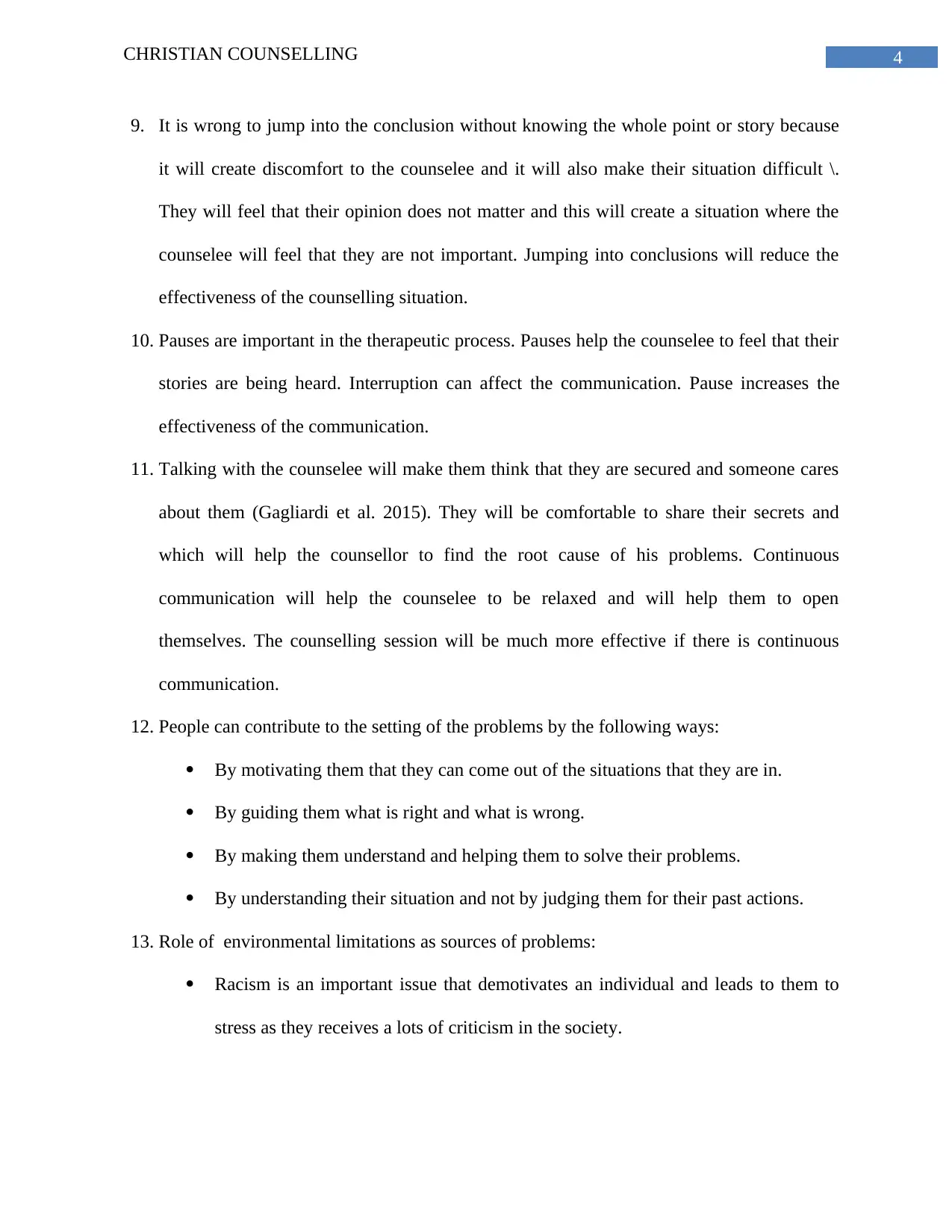
4CHRISTIAN COUNSELLING
9. It is wrong to jump into the conclusion without knowing the whole point or story because
it will create discomfort to the counselee and it will also make their situation difficult \.
They will feel that their opinion does not matter and this will create a situation where the
counselee will feel that they are not important. Jumping into conclusions will reduce the
effectiveness of the counselling situation.
10. Pauses are important in the therapeutic process. Pauses help the counselee to feel that their
stories are being heard. Interruption can affect the communication. Pause increases the
effectiveness of the communication.
11. Talking with the counselee will make them think that they are secured and someone cares
about them (Gagliardi et al. 2015). They will be comfortable to share their secrets and
which will help the counsellor to find the root cause of his problems. Continuous
communication will help the counselee to be relaxed and will help them to open
themselves. The counselling session will be much more effective if there is continuous
communication.
12. People can contribute to the setting of the problems by the following ways:
By motivating them that they can come out of the situations that they are in.
By guiding them what is right and what is wrong.
By making them understand and helping them to solve their problems.
By understanding their situation and not by judging them for their past actions.
13. Role of environmental limitations as sources of problems:
Racism is an important issue that demotivates an individual and leads to them to
stress as they receives a lots of criticism in the society.
9. It is wrong to jump into the conclusion without knowing the whole point or story because
it will create discomfort to the counselee and it will also make their situation difficult \.
They will feel that their opinion does not matter and this will create a situation where the
counselee will feel that they are not important. Jumping into conclusions will reduce the
effectiveness of the counselling situation.
10. Pauses are important in the therapeutic process. Pauses help the counselee to feel that their
stories are being heard. Interruption can affect the communication. Pause increases the
effectiveness of the communication.
11. Talking with the counselee will make them think that they are secured and someone cares
about them (Gagliardi et al. 2015). They will be comfortable to share their secrets and
which will help the counsellor to find the root cause of his problems. Continuous
communication will help the counselee to be relaxed and will help them to open
themselves. The counselling session will be much more effective if there is continuous
communication.
12. People can contribute to the setting of the problems by the following ways:
By motivating them that they can come out of the situations that they are in.
By guiding them what is right and what is wrong.
By making them understand and helping them to solve their problems.
By understanding their situation and not by judging them for their past actions.
13. Role of environmental limitations as sources of problems:
Racism is an important issue that demotivates an individual and leads to them to
stress as they receives a lots of criticism in the society.
Paraphrase This Document
Need a fresh take? Get an instant paraphrase of this document with our AI Paraphraser
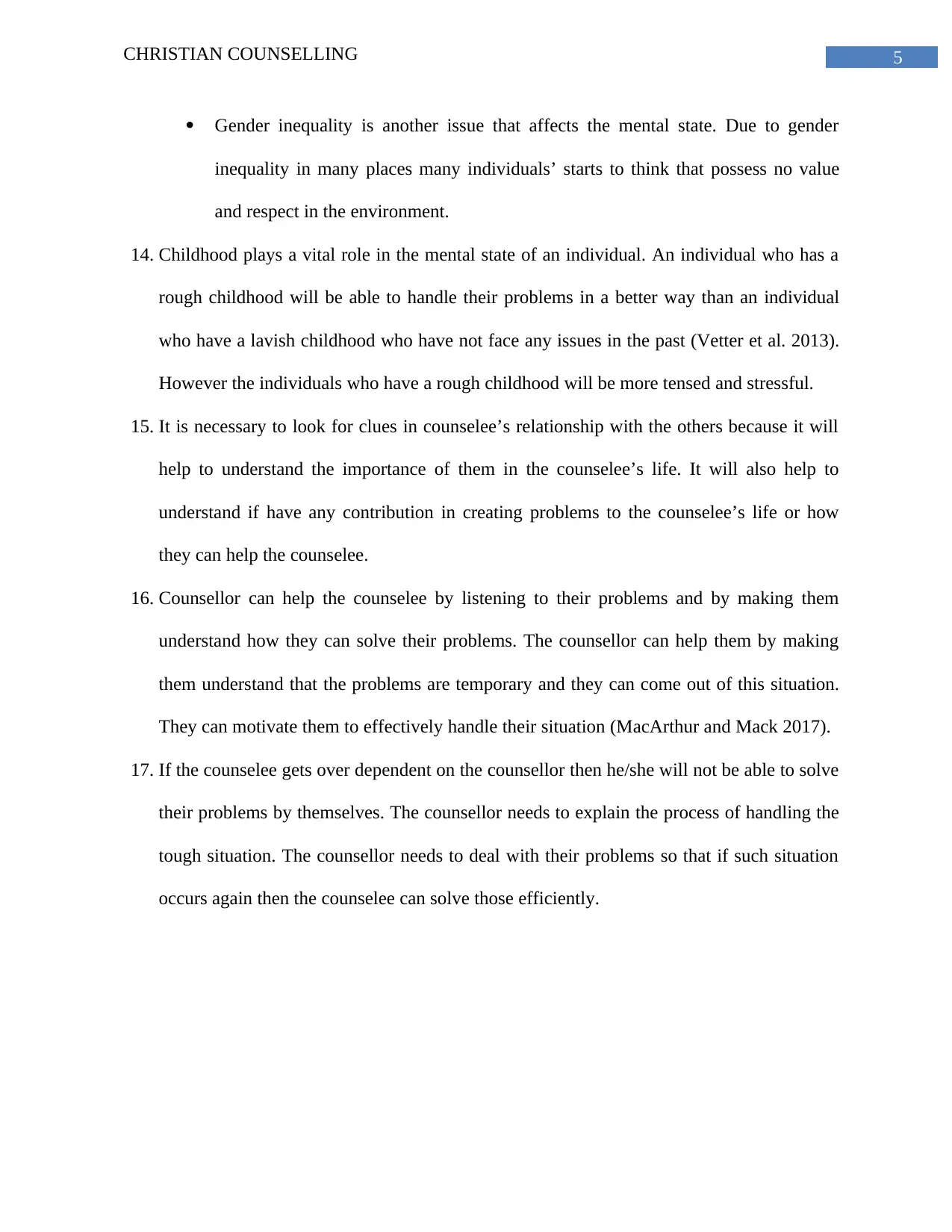
5CHRISTIAN COUNSELLING
Gender inequality is another issue that affects the mental state. Due to gender
inequality in many places many individuals’ starts to think that possess no value
and respect in the environment.
14. Childhood plays a vital role in the mental state of an individual. An individual who has a
rough childhood will be able to handle their problems in a better way than an individual
who have a lavish childhood who have not face any issues in the past (Vetter et al. 2013).
However the individuals who have a rough childhood will be more tensed and stressful.
15. It is necessary to look for clues in counselee’s relationship with the others because it will
help to understand the importance of them in the counselee’s life. It will also help to
understand if have any contribution in creating problems to the counselee’s life or how
they can help the counselee.
16. Counsellor can help the counselee by listening to their problems and by making them
understand how they can solve their problems. The counsellor can help them by making
them understand that the problems are temporary and they can come out of this situation.
They can motivate them to effectively handle their situation (MacArthur and Mack 2017).
17. If the counselee gets over dependent on the counsellor then he/she will not be able to solve
their problems by themselves. The counsellor needs to explain the process of handling the
tough situation. The counsellor needs to deal with their problems so that if such situation
occurs again then the counselee can solve those efficiently.
Gender inequality is another issue that affects the mental state. Due to gender
inequality in many places many individuals’ starts to think that possess no value
and respect in the environment.
14. Childhood plays a vital role in the mental state of an individual. An individual who has a
rough childhood will be able to handle their problems in a better way than an individual
who have a lavish childhood who have not face any issues in the past (Vetter et al. 2013).
However the individuals who have a rough childhood will be more tensed and stressful.
15. It is necessary to look for clues in counselee’s relationship with the others because it will
help to understand the importance of them in the counselee’s life. It will also help to
understand if have any contribution in creating problems to the counselee’s life or how
they can help the counselee.
16. Counsellor can help the counselee by listening to their problems and by making them
understand how they can solve their problems. The counsellor can help them by making
them understand that the problems are temporary and they can come out of this situation.
They can motivate them to effectively handle their situation (MacArthur and Mack 2017).
17. If the counselee gets over dependent on the counsellor then he/she will not be able to solve
their problems by themselves. The counsellor needs to explain the process of handling the
tough situation. The counsellor needs to deal with their problems so that if such situation
occurs again then the counselee can solve those efficiently.
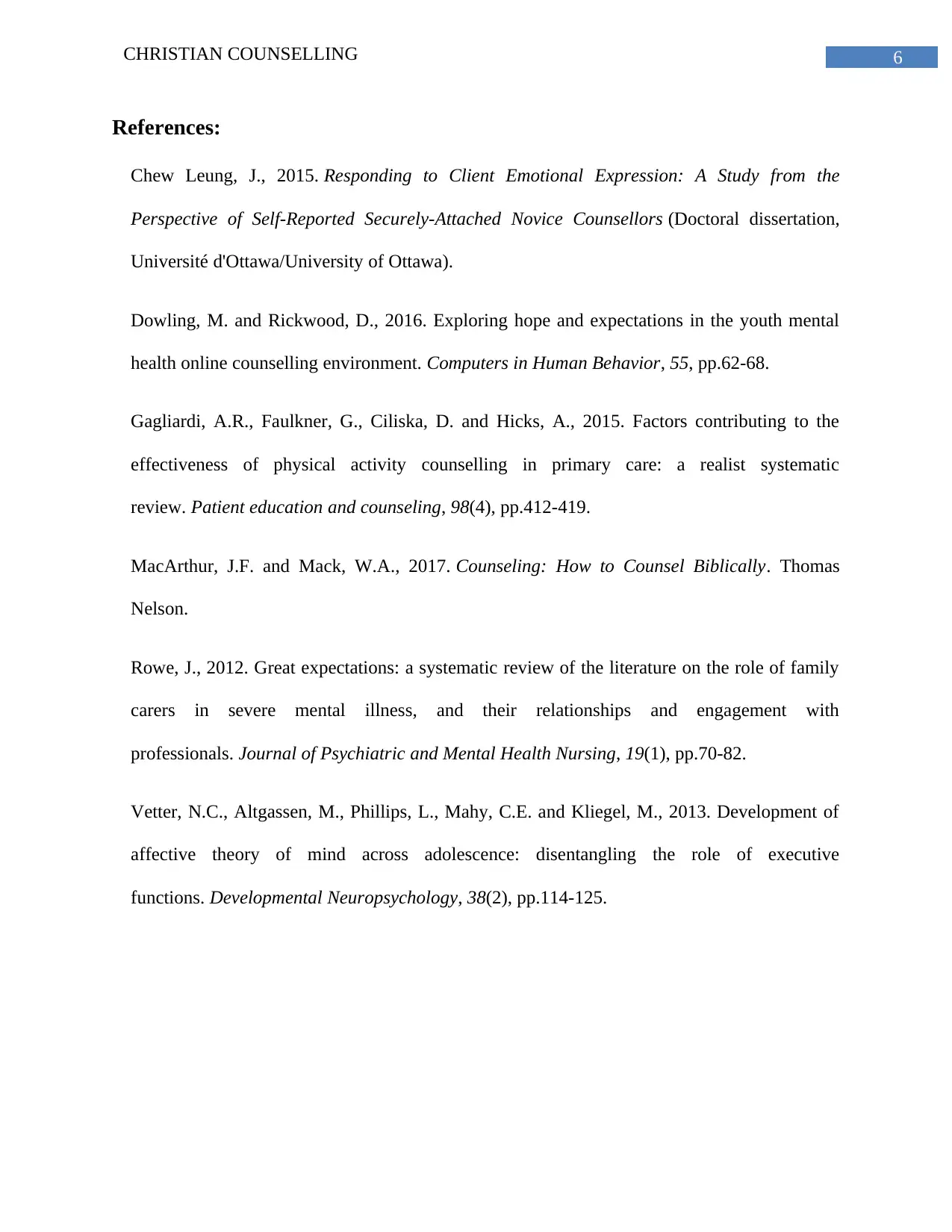
6CHRISTIAN COUNSELLING
References:
Chew Leung, J., 2015. Responding to Client Emotional Expression: A Study from the
Perspective of Self-Reported Securely-Attached Novice Counsellors (Doctoral dissertation,
Université d'Ottawa/University of Ottawa).
Dowling, M. and Rickwood, D., 2016. Exploring hope and expectations in the youth mental
health online counselling environment. Computers in Human Behavior, 55, pp.62-68.
Gagliardi, A.R., Faulkner, G., Ciliska, D. and Hicks, A., 2015. Factors contributing to the
effectiveness of physical activity counselling in primary care: a realist systematic
review. Patient education and counseling, 98(4), pp.412-419.
MacArthur, J.F. and Mack, W.A., 2017. Counseling: How to Counsel Biblically. Thomas
Nelson.
Rowe, J., 2012. Great expectations: a systematic review of the literature on the role of family
carers in severe mental illness, and their relationships and engagement with
professionals. Journal of Psychiatric and Mental Health Nursing, 19(1), pp.70-82.
Vetter, N.C., Altgassen, M., Phillips, L., Mahy, C.E. and Kliegel, M., 2013. Development of
affective theory of mind across adolescence: disentangling the role of executive
functions. Developmental Neuropsychology, 38(2), pp.114-125.
References:
Chew Leung, J., 2015. Responding to Client Emotional Expression: A Study from the
Perspective of Self-Reported Securely-Attached Novice Counsellors (Doctoral dissertation,
Université d'Ottawa/University of Ottawa).
Dowling, M. and Rickwood, D., 2016. Exploring hope and expectations in the youth mental
health online counselling environment. Computers in Human Behavior, 55, pp.62-68.
Gagliardi, A.R., Faulkner, G., Ciliska, D. and Hicks, A., 2015. Factors contributing to the
effectiveness of physical activity counselling in primary care: a realist systematic
review. Patient education and counseling, 98(4), pp.412-419.
MacArthur, J.F. and Mack, W.A., 2017. Counseling: How to Counsel Biblically. Thomas
Nelson.
Rowe, J., 2012. Great expectations: a systematic review of the literature on the role of family
carers in severe mental illness, and their relationships and engagement with
professionals. Journal of Psychiatric and Mental Health Nursing, 19(1), pp.70-82.
Vetter, N.C., Altgassen, M., Phillips, L., Mahy, C.E. and Kliegel, M., 2013. Development of
affective theory of mind across adolescence: disentangling the role of executive
functions. Developmental Neuropsychology, 38(2), pp.114-125.
⊘ This is a preview!⊘
Do you want full access?
Subscribe today to unlock all pages.

Trusted by 1+ million students worldwide

7CHRISTIAN COUNSELLING
1 out of 7
Related Documents
Your All-in-One AI-Powered Toolkit for Academic Success.
+13062052269
info@desklib.com
Available 24*7 on WhatsApp / Email
![[object Object]](/_next/static/media/star-bottom.7253800d.svg)
Unlock your academic potential
Copyright © 2020–2026 A2Z Services. All Rights Reserved. Developed and managed by ZUCOL.





